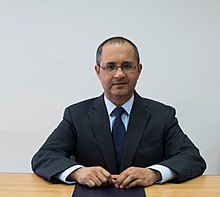
Vasopressin V1b receptor (V1BR) also known as vasopressin 3 receptor (VPR3) or antidiuretic hormone receptor 1B is a protein that in humans is encoded by the AVPR1B gene.
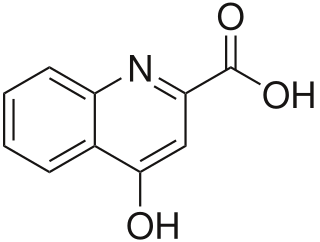
Kynurenic acid is a product of the normal metabolism of amino acid L-tryptophan. It has been shown that kynurenic acid possesses neuroactive activity. It acts as an antiexcitotoxic and anticonvulsant, most likely through acting as an antagonist at excitatory amino acid receptors. Because of this activity, it may influence important neurophysiological and neuropathological processes. As a result, kynurenic acid has been considered for use in therapy in certain neurobiological disorders. Conversely, increased levels of kynurenic acid have also been linked to certain pathological conditions.

Wim E. Crusio is a Dutch behavioral neurogeneticist and a directeur de recherche with the French National Centre for Scientific Research in Talence, France.

Jacqueline N. Crawley is an American behavioral neuroscientist and an expert on rodent behavioral analysis. Since July 2012, she is the Robert E. Chason Chair in Translational Research in the MIND Institute and professor of psychiatry and behavioral sciences at the University of California, Davis School of Medicine in Sacramento. Previously, from 1983–2012, she was chief of the Laboratory of Behavioral Neuroscience in the intramural program of the National Institute of Mental Health. Her translational research program focuses on testing hypotheses about the genetic causes of autism spectrum disorders and discovering treatments for the diagnostic symptoms of autism, using mouse models. She has published more than 275 peer-reviewed articles in scientific journals and 110 review articles and book chapters. According to Scopus, her works have been cited over 36,000 times, giving her an h-index of 99. She has co-edited 4 books and is the author of What's Wrong With my Mouse? Behavioral Phenotyping of Transgenic and Knockout Mice, which was very well received.
Terrie Edith Moffitt is an American-British clinical psychologist who is best known for her pioneering research on the development of antisocial behavior and for her collaboration with colleague and partner Avshalom Caspi in research on gene-environment interactions in mental disorders.

Hermona Soreq is an Israeli professor of Molecular Neuroscience at The Hebrew University of Jerusalem. Best known for her work on the signaling of acetylcholine and its relevance in stress responses and neurodegenerative diseases such as Parkinson's and Alzheimer's.

Julio Licinio is an Australian American psychiatrist who is SUNY Distinguished Professor at State University of New York Upstate Medical University in Syracuse, New York. He is simultaneously Matthew Flinders Distinguished Professor of Psychiatry at Flinders University in Adelaide. Licinio has been Senior Vice President for Academic and Health Affairs, as well as Executive Dean, College of Medicine. Licinio is the founding and current chief editor of three journals from Springer Nature, Molecular Psychiatry, Translational Psychiatry, and Discover Mental Health.
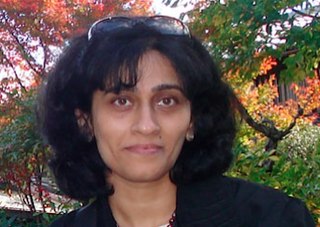
Vidita Vaidya is an Indian neuroscientist and professor at the Tata Institute of Fundamental Research, Mumbai. Her primary areas of research are neuroscience and molecular psychiatry.

Raz Yirmiya is an Israeli behavioral neuroscientist and director of the Laboratory for Psychoneuroimmunology at the Hebrew University of Jerusalem in Israel. He is best known for providing the first experimental evidence for the role of immune system activation in depression, for discovering that disturbances in brain microglia cells underlie some forms of depression, and for elucidating the involvement of inflammatory cytokines in regulation of cognitive and emotional processes.

Giulio Maria Pasinetti is the Program Director of the Center on Molecular Integrative Neuroresilience and is the Saunders Family Chair in Neurology at the Icahn School of Medicine at Mount Sinai (ISMMS) in New York City. Pasinetti is a Professor of Neurology, Psychiatry, Neuroscience, and Geriatrics and Palliative Medicine at ISMMS.

Jean Elise Schaffer is an American physician-scientist. She is a Senior Investigator at the Joslin Diabetes Center, where she also serves as Associate Research Director, and she is Professor of Medicine at Harvard Medical School. Her work focuses on fundamental mechanisms of metabolic stress responses and the pathophysiology of diabetes complications.
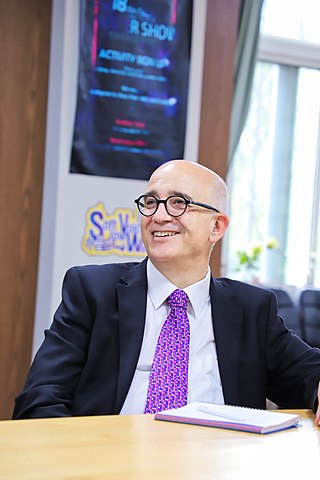
Antonio Vidal-Puig is a Spanish medical doctor and scientist who works as a Professor of Molecular Nutrition and Metabolism at the University of Cambridge (UK), best known for advancing the concept that pharmacological targeting of brown fat may serve to treat overweight and obesity in affected individuals, as well as for introducing the concept of adipose tissue "expandability" as an important factor in the pathogenesis of insulin resistance in the context of positive energy balance. His published work focuses on areas such as adipose tissue metabolism and lipotoxicity, regulation of insulin secretion, and the pathophysiology of metabolic syndrome, obesity, and type 2 diabetes.
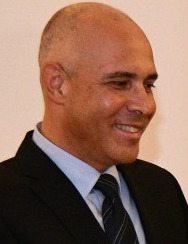
Alon Chen is an Israeli neuroscientist and the 11th President of the Weizmann Institute of Science.

Isabelle M. Mansuy is a professor in neuroepigenetics in the Medical Faculty of the University of Zurich and the Department of Health Science and Technology of the Swiss Federal Institute of Technology Zurich. She is known for her work on the mechanisms of epigenetic inheritance in relation to childhood trauma.
Christine Denny is an American neuroscientist and associate professor of Clinical Neurobiology in Psychiatry in the Department of Psychiatry at Columbia University Irving Medical Center in New York City. Denny investigates the molecular mechanisms underlying learning and memory. She developed a novel technique to label neurons that encode specific memories. She used this technique to probe what happens to hippocampal memory traces in different disease states.
Randy J. Nelson is an American neuroscientist who holds the Hazel Ruby McQuain Chair for Neurological Research and the founding chair of the Department of Neuroscience at the West Virginia University School of Medicine. Much of his research has focused on the contribution of circadian and seasonal rhythms on physiology and behavior.
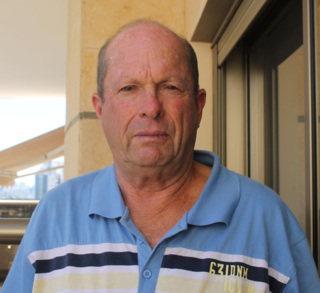
Joseph Yanai is a researcher pioneering in studying the reversal of neurobehavioral birth defects in animal models. He serves as a professor and Director of the Ross Laboratory for Studies in Neural Birth Defects at the Department of Medical Neurobiology, The Institute For Medical Research, Israel-Canada (IMRIC) at the Hebrew University-Hadassah Medical School Jerusalem, Israel and was also appointed as Adjunct Professor, Department of Pharmacology and Cancer Biology, Duke University School of Medicine, Durham, NC, USA.
Colleen Ann McClung is an American chronobiologist and neuroscientist. She is a professor at the University of Pittsburgh and a fellow of the American College of Neuropsychopharmacology.

Haim Cohen is a full professor at the Faculty of Life Sciences at Bar Ilan University who studies the molecular mechanisms that determine the rate of aging. Cohen researches longevity and healthy aging. He is the founder and director of the Master's degree program in gerontology at Bar Ilan University. He also heads the Minerva Israel-Germany Center for Biological Mechanisms of Aging, and heads the Sagol Healthy Aging and Longevity Center in Humans.
Sagiv Shifman is an Israeli scientist, professor in the field of neurogenetics at the Alexander Silberman Institute of Life Sciences, The Hebrew University of Jerusalem. He holds the Arnold and Bess Zeldich Ungerman chair in Neurobiology.
